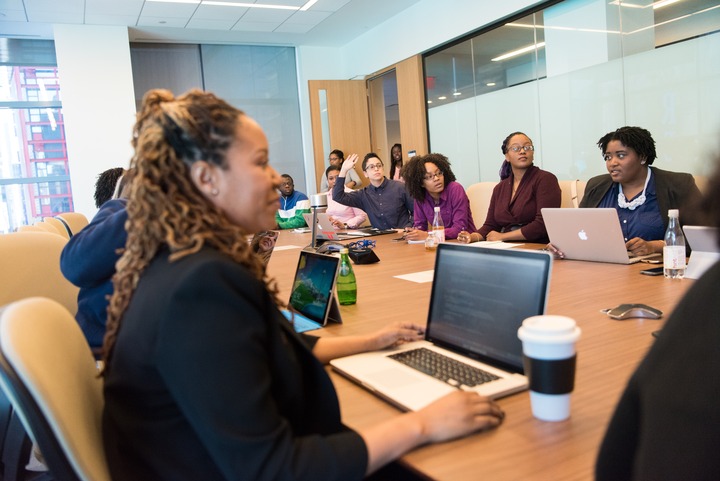
Table of Contents
The Role of a Media Trainer: Skills and Responsibilities
Step into the world of media training, where passion and expertise collide to shape the next generation of communicators. Feel the electric energy that fills the air as media trainers take on the crucial responsibility of equipping individuals with the skills and confidence to navigate the dynamic realm of media. Their role goes beyond teaching; it is a sacred mission to empower and guide aspiring media professionals towards success and influence. Embrace the power of effective communication as the cornerstone of a media trainer’s role. Feel their unwavering dedication to developing exceptional communication skills in individuals. Witness how they instill the art of articulate expression, captivating storytelling, and impactful delivery. Media trainers impart the ability to connect with audiences, convey messages with clarity, and leave a lasting impact through the power of words and visuals. Experience the transformative influence of media trainers as they help individuals navigate the complex landscape of media platforms and technologies. Feel their expertise in leveraging social media, video production, journalism ethics, and media relations. Witness how they guide individuals to become responsible, ethical, and influential media practitioners, equipped with the knowledge and skills to navigate the evolving media landscape. Embrace the spirit of mentorship that defines a media trainer’s responsibility. Feel their commitment to nurturing talent, fostering creativity, and empowering individuals to find their unique voice.

Witness how they provide constructive feedback, guidance, and mentorship, shaping not only technical skills but also the character, integrity, and professionalism of media practitioners. Through mentorship, media trainers become champions of growth, guiding individuals towards their full potential. Discover the versatile skill set possessed by media trainers. Feel their ability to teach media production, digital storytelling, media ethics, media analysis, and crisis communication. Witness how they adapt to the ever-evolving media landscape, staying updated with emerging technologies and industry trends. Media trainers are not just instructors; they are lifelong learners who inspire individuals to embrace change, innovate, and excel in the ever-evolving media industry. Embrace the responsibility of media trainers to cultivate resilience and adaptability in individuals. Feel their commitment to preparing media professionals to thrive in high-pressure environments, handle criticism, and navigate challenging situations with grace. Witness how they foster a growth mindset, teaching individuals to embrace failures as stepping stones to success, and empowering them to overcome obstacles with resilience and determination.
Experience the profound impact of media trainers on shaping the future of media. Feel the ripple effect of their influence as individuals become skilled storytellers, informed media consumers, and ethical communicators. Witness how media trainers create a legacy by producing a new generation of media professionals who are poised to make a positive impact on society, shape public opinion, and contribute to the betterment of the world. In this exploration of the role of a media trainer, we celebrate their unwavering commitment, expertise, and passion for shaping the media landscape. Feel the sense of fulfillment and purpose they derive from witnessing the growth, achievements, and successes of their trainees. Their responsibilities extend beyond technical skills; they foster creativity, ethical conduct, and societal impact. Media trainers are the guiding lights that empower individuals to shine in the realm of media, forever leaving their mark on the ever-evolving media landscape.
Enter the captivating world of media training, where passion and expertise intertwine to shape the future of communication. Feel the pulsating energy as media trainers embrace their pivotal role in empowering individuals to navigate the ever-changing media landscape. Beyond mere instruction, their responsibility is a sacred calling to nurture and guide aspiring media professionals, instilling them with the skills and confidence to excel in the realm of media. Embrace the power of effective communication as the foundation of a media trainer’s role. Feel their unwavering commitment to developing exceptional communication skills in individuals. Witness how they ignite the art of captivating storytelling, articulate expression, and impactful delivery. Media trainers are purveyors of connection, equipping individuals with the ability to engage audiences, convey messages with clarity, and leave an indelible impact through the magic of words and visuals.
Experience the transformative influence of media trainers as they navigate the complex landscape of media platforms and technologies. Feel their expertise in harnessing the potential of social media, mastering video production, upholding journalism ethics, and navigating media relations. Witness how they guide individuals to become responsible, ethical, and influential media practitioners, equipped with the knowledge and skills to navigate the ever-evolving media landscape. Embrace the spirit of mentorship that defines a media trainer’s responsibility. Feel their unwavering dedication to nurturing talent, fostering creativity, and empowering individuals to find their authentic voice. Witness how they provide constructive feedback, guidance, and mentorship, shaping not only technical skills but also the character, integrity, and professionalism of media practitioners. Media trainers become beacons of inspiration, champions of growth, and catalysts for individual transformation. Discover the versatile skill set possessed by media trainers. Feel their ability to impart expertise in media production, digital storytelling, media ethics, critical analysis, and crisis communication. Witness how they adapt to the ever-evolving media landscape, staying abreast of emerging technologies and industry trends. Media trainers are not mere instructors; they embody the spirit of lifelong learning, inspiring individuals to embrace change, innovate, and excel in the dynamic realm of media. In this exploration of the role of a media trainer, we celebrate their unwavering commitment, expertise, and passion for shaping the future of media. Feel the profound impact they have on molding individuals into skilled storytellers, informed media consumers, and ethical communicators. Media trainers hold the power to shape public opinion, influence societal narratives, and contribute to positive change. They are the guiding lights that illuminate the path for aspiring media professionals, forever leaving an indelible mark on the ever-evolving media landscape.
Effective Techniques for Media Training: Strategies Used by Successful Media Trainers
Embarking on the journey of media training is a thrilling and dynamic experience that fills trainers with a sense of purpose and excitement. Successful media trainers understand the power of effective communication and employ a range of techniques to help individuals navigate the media landscape with confidence and poise. Their passion for empowering others and witnessing their growth drives them to utilize strategies that lead to successful media training. One of the key strategies employed by successful media trainers is the development of strong storytelling skills. They understand that storytelling engages audiences on an emotional level, allowing messages to resonate and be remembered. The emotions of inspiration and connection drive trainers to guide individuals in crafting compelling narratives that captivate and influence viewers, listeners, and readers. Effective media trainers also emphasize the importance of non-verbal communication. They understand that body language, facial expressions, and vocal tone can greatly impact the message being conveyed. The emotions of awareness and authenticity guide trainers as they help individuals project confidence and credibility through their physical presence, fostering trust and engagement with their audience.

Successful media trainers recognize the significance of message preparation and articulation. They help individuals distill complex ideas into clear and concise statements that are easily understood by diverse audiences. The emotions of clarity and focus drive trainers to assist individuals in organizing their thoughts, crafting key messages, and delivering them with impact and conviction. Building media interview skills is another crucial aspect of effective media training. Successful trainers create realistic and challenging scenarios that simulate media interactions, allowing individuals to practice handling difficult questions and maintaining composure under pressure. The emotions of resilience and adaptability guide trainers as they provide constructive feedback and support, helping individuals refine their interview techniques. Successful media trainers also emphasize the importance of media literacy and understanding the media landscape. They educate individuals on media ethics, biases, and the impact of social media. The emotions of empowerment and critical thinking drive trainers to equip individuals with the skills to navigate media environments responsibly, ensuring that their messages are accurately conveyed and received.
Effective media trainers recognize the power of building relationships with media professionals. They guide individuals in cultivating connections with journalists, producers, and influencers, fostering mutually beneficial partnerships. The emotions of networking and collaboration fuel trainers’ commitment to helping individuals forge meaningful relationships that amplify their reach and impact. In conclusion, effective techniques for media training encompass storytelling, non-verbal communication, message preparation, interview skills, media literacy, and relationship building. Successful media trainers empower individuals to confidently communicate their messages and navigate the media landscape. Let us embrace these strategies with passion and a genuine desire to empower others, knowing that our efforts as media trainers can make a profound impact on individuals’ ability to effectively engage with audiences and shape public perception. Successful media trainers understand the significance of media simulation exercises. They create immersive and realistic scenarios that mirror the pressures and dynamics of real media interactions. The emotions of intensity and determination fill the training space as trainers guide individuals through these simulations, allowing them to practice their media skills in a controlled environment. Witnessing individuals grow in confidence and competence during these exercises fuels trainers’ passion for effective media training.
Another effective technique employed by skilled media trainers is the art of bridging and redirecting. They equip individuals with strategies to steer conversations back to their key messages, even in challenging or hostile situations. The emotions of resourcefulness and composure guide trainers as they teach individuals to navigate difficult questions and maintain control over the narrative. The satisfaction of seeing individuals skillfully redirect discussions reinforces trainers’ commitment to equipping them with effective media strategies. Successful media trainers also emphasize the importance of audience analysis and tailored communication. They guide individuals to understand their target audience’s needs, interests, and values, enabling them to deliver messages that resonate and engage. The emotions of empathy and connection drive trainers to help individuals build rapport with their audience, fostering a deeper level of engagement and trust. Effective media trainers recognize the value of media monitoring and analysis. They encourage individuals to stay informed about media trends, coverage of relevant topics, and public opinion. The emotions of curiosity and vigilance guide trainers as they assist individuals in analyzing media coverage, identifying opportunities for proactive engagement or response. The satisfaction of empowering individuals to shape the narrative and influence public discourse motivates trainers to stay abreast of media developments. Successful media trainers also understand the importance of managing emotions during media interactions. They provide individuals with techniques to remain composed, handle difficult emotions, and respond authentically under pressure. The emotions of self-awareness and emotional resilience guide trainers as they help individuals stay grounded and maintain a positive image even in challenging situations. Witnessing individuals navigate media encounters with grace and professionalism fills trainers with pride and reinforces the importance of emotional intelligence in media training.
Incorporating media technology and digital platforms is another technique used by successful media trainers. They assist individuals in utilizing various media tools, such as video interviews, live streaming, and social media platforms, to enhance their reach and engagement with their target audience. The emotions of innovation and adaptability fuel trainers’ commitment to exploring new technologies and empowering individuals to leverage them effectively. In conclusion, effective techniques for media training encompass a range of strategies driven by emotions such as intensity, resourcefulness, empathy, curiosity, and emotional resilience. Successful media trainers utilize media simulations, bridging and redirecting, audience analysis, media monitoring, emotion management, and technology integration to create transformative media training experiences. Let us embrace these strategies with passion and a genuine desire to empower others, knowing that our efforts as skilled media trainers can shape individuals into confident and influential communicators in the ever-evolving media landscape.
Media Training for Public Figures: Importance and Best Practices
As public figures, we understand the immense importance of media training in our journey. It fills us with a sense of anticipation and readiness as we recognize the power of effective communication in shaping public perception. Media training becomes our guiding light, equipping us with the skills and strategies needed to navigate the media landscape with confidence and authenticity. The emotions of empowerment and self-assurance surge through us as we delve into the world of media training. We comprehend the significance of crafting our message in a compelling and persuasive manner. Media training allows us to develop the art of articulation, enabling us to convey our thoughts and ideas with clarity, conviction, and emotional impact. Preparation becomes our emotional armor as we embrace the rigorous process of media training. We immerse ourselves in researching and refining our key messages, anticipating the questions and challenges that may come our way. This diligent preparation instills a deep sense of readiness and equips us to tackle interviews and media interactions with poise and confidence. The emotions of gratitude and growth flood our hearts as we embrace constructive feedback during media training.

We appreciate the guidance and insights shared by our trainers, who help us fine-tune our communication skills and harness our unique strengths. This feedback-driven growth fuels our motivation to continually improve and excel in our media engagements. The emotions of trust and camaraderie flourish in our relationship with media trainers. We seek mentors who understand the unique challenges we face as public figures and provide guidance tailored to our specific needs. This bond of trust and support allows us to freely explore our vulnerabilities, refine our techniques, and develop a media presence that resonates with authenticity. Media training becomes a transformative emotional journey of self-discovery and adaptability. Through interactive exercises and simulations, we unlock our potential, honing our non-verbal communication skills and learning to connect with our audience on a deeper level. This emotional growth empowers us to convey empathy, sincerity, and passion through our words and actions.
The emotions of resilience and adaptability fuel our pursuit of media training excellence. We acknowledge the ever-evolving nature of the media landscape and the need to stay agile in this fast-paced world. Media training equips us with the tools to navigate traditional media platforms as well as the dynamic realm of social media, ensuring our message reaches diverse audiences. The notion of media training fills us with a profound sense of significance and responsibility. As public figures, we recognize the impact our words and actions can have on society. The emotional weight of this realization drives us to seek media training as a means to harness our influence effectively, ensuring that our messages resonate and inspire positive change. The emotions of curiosity and eagerness ignite within us as we embark on our media training journey. We understand that media interactions provide an opportunity to connect with the public and convey our vision with authenticity. Media training empowers us to cultivate a captivating presence, engaging our audience’s emotions and leaving a lasting impression.
The emotions of vulnerability and self-reflection emerge during media training. We delve into the depths of our own beliefs and values, exploring how they align with our public image. This introspection allows us to connect with our own emotions, enabling us to communicate our messages with sincerity and empathy. Media training awakens within us the emotions of adaptability and agility. We recognize that the media landscape is constantly evolving, presenting new platforms and challenges. Through training, we develop the flexibility to navigate diverse media channels, ensuring our message reaches a wide range of audiences and resonates with their emotional experiences. The emotions of camaraderie and support flourish within our media training experiences. We build connections with fellow public figures, sharing our triumphs, challenges, and lessons learned. Together, we provide a support system that fuels our growth and fosters an environment of collaboration and empathy.
The emotions of satisfaction and pride accompany the honing of our media skills. We take pride in our ability to deliver impactful messages that evoke emotions and drive positive change. Seeing the impact of our media training efforts on society fills us with a profound sense of accomplishment and encourages us to continually refine our skills. The emotions of responsibility and accountability drive our commitment to best practices in media training. We understand the importance of upholding ethical standards, avoiding sensationalism, and ensuring accuracy in our messaging. Through best practices, we strive to create a media landscape that is honest, empathetic, and representative of diverse voices. Within the realm of media training, emotions of determination and eagerness fuel our journey towards excellence. We approach each training session with an insatiable curiosity, eager to learn new techniques and strategies that will amplify our message. The anticipation of honing our skills and unlocking our full potential fills us with a sense of excitement and motivation.
The emotions of vulnerability and self-reflection emerge as we delve into the depths of our own beliefs and values. We recognize the need to align our public image with our authentic selves, to establish a genuine connection with our audience. This introspection allows us to tap into our emotions, infusing our communication with sincerity, empathy, and relatability. Through media training, we cultivate a profound sense of resilience and adaptability. The ever-evolving media landscape presents new challenges and opportunities, requiring us to stay agile and responsive. We embrace the emotions of flexibility and quick thinking, equipping ourselves to navigate diverse media platforms and connect with a wide range of audiences. The emotions of camaraderie and support envelop us as we engage with our media trainers and peers. We form connections, sharing our triumphs, struggles, and lessons learned. The support system we create fuels our growth, provides valuable feedback, and fosters an environment of collaboration, empathy, and mutual growth. Media training instills within us a deep sense of pride and accomplishment. As we witness the impact of our refined skills and authentic communication, we feel a surge of satisfaction. We take pride in delivering messages that evoke emotions, inspire change, and contribute positively to society. In conclusion, media training for public figures is an emotional journey of growth, self-reflection, resilience, and camaraderie. It empowers us to connect with our audience on a deeper level, amplifying our message and shaping narratives. By embracing the emotions inherent in this training, we become effective agents of change, promoting authenticity, empathy, and integrity in our media interactions.
Preparing for Media Interviews: Tips and Strategies from Media Trainers
Welcome to the fast-paced world of media interviews, where arrangement is key and each word matters! Get prepared to drench yourself within the invigorating travel of acing the craftsmanship of effective communication with the assistance of prepared media coaches. Feel the surge of fervor as we dig into the important tips and strategies that will enable you to sparkle before the camera, fascinate your gathering of people, and pass on your message with certainty and affect. To begin with and preeminent, grasp the control of planning. Permit the expectation to fuel your determination as you inquire about and familiarize yourself with the subject at hand. Altogether get the reason and destinations of the meet, accumulate significant information, and expect potential questions. By contributing time and exertion in planning, you may ooze a sense of specialist and skill, empowering you to explore the interview with balance and clarity. Feel the feeling of compassion as you put yourself within the shoes of your gathering of people. Get their needs, concerns, and interests, and tailor your information appropriately. Interface on a more profound level by joining relatable illustrations, accounts, and stories that resound together with your audience’s encounters. Sympathy makes a veritable association, making your meet paramount and impactful.

Grasp the invigoration of narrating as you make a compelling account. Weave your key messages into a coherent and locked in story that captures the consideration and creative ability of your group of onlookers. Utilize striking dialect, compelling visuals, and individual encounters to bring your story to life, bringing out feelings and making an enduring impression. Consider the feeling of certainty as you fine-tune your body dialect and non-verbal cues. Stand tall, keep up eye contact, and ooze an air of self-assurance. Be careful of your signals, facial expressions, and tone of voice, guaranteeing they adjust along with your expected message. Certainty ingrains belief and validity, captivating your group of onlookers and upgrading your by and large effect. Feel the elation of versatility as you explore unforeseen turns and turns amid the meet. Be arranged to think on your feet, react to challenging questions, and adjust your informing in like manner. Grasp the suddenness of the minute, remaining calm and composed, and conveying keen and express answers indeed in high-pressure situations.
Let the feeling of authenticity direct your meeting. Be genuine to yourself, talk from the heart, and let your enthusiasm and eagerness sparkle through. Realness makes a veritable association together with your group of onlookers, causing belief and compatibility. After you are true, your message resounds more profoundly, taking off an enduring impression on your gathering of people. Consider the feeling of appreciation as you reflect on the opportunity to share your skill and experiences with the media. Appreciate the stage you’ve been given to communicate your message and make an effect. Approach the meeting with a sense of lowliness and appreciation, and express your appreciation to the questioner and the gathering of people for their time and consideration. Feel the surge of fulfillment as you analyze your execution and look for nonstop change. Reflect on your qualities and zones for development, and use criticism from media coaches and colleagues to refine your abilities. Grasp a development mentality, continuously endeavoring to enhance your communication capacities and advance as a successful representative.
Feel the emotion of resilience as you prepare for media interviews. Recognize that not every interview will go perfectly, and that’s okay. Embrace the challenges and setbacks as opportunities for growth and learning. Reframe any negative experiences as valuable lessons that will only make you stronger and more prepared for future interviews. With resilience as your guiding force, you will bounce back from any setbacks and continue to refine your skills. Embrace the emotion of enthusiasm as you approach media interviews. Let your passion and excitement for your topic shine through in every word and gesture. When you convey genuine enthusiasm, your audience will be captivated and inspired by your energy. Embrace the opportunity to share your knowledge and expertise with the world, and let your enthusiasm serve as a magnet that draws people in and keeps them engaged. Consider the emotion of grace under pressure as you face challenging interview situations. Stay composed and collected even in the face of difficult questions or unexpected circumstances. Take a deep breath, gather your thoughts, and respond with clarity and poise. When you exude grace under pressure, you command respect and demonstrate your professionalism. Trust in your preparation and expertise, and let your calm and collected demeanor guide you through any interview scenario.
Feel the emotion of resilience as you prepare for media interviews. Recognize that not every interview will go perfectly, and that’s okay. Embrace the challenges and setbacks as opportunities for growth and learning. Reframe any negative experiences as valuable lessons that will only make you stronger and more prepared for future interviews. With resilience as your guiding force, you will bounce back from any setbacks and continue to refine your skills. Embrace the emotion of enthusiasm as you approach media interviews. Let your passion and excitement for your topic shine through in every word and gesture. When you convey genuine enthusiasm, your audience will be captivated and inspired by your energy. Embrace the opportunity to share your knowledge and expertise with the world, and let your enthusiasm serve as a magnet that draws people in and keeps them engaged. Consider the emotion of grace under pressure as you face challenging interview situations. Stay composed and collected even in the face of difficult questions or unexpected circumstances. Take a deep breath, gather your thoughts, and respond with clarity and poise. When you exude grace under pressure, you command respect and demonstrate your professionalism. Trust in your preparation and expertise, and let your calm and collected demeanor guide you through any interview scenario. In conclusion, planning for media interviews is an invigorating travel that requires devotion, arrangement, and a deep understanding of viable communication techniques. By grasping the control of arrangement, compassion, narrating, certainty, versatility, genuineness, appreciation, and nonstop advancement, you’ll ace the craftsmanship of media interviews and take off an enduring effect on your group of onlookers. So, buckle up, grasp the energy, and get prepared to sparkle as you explore the world of media interviews with artfulness and artfulness.
Building Confidence in Media Engagements: Techniques for Media Trainers
Building confidence in media engagements is a thrilling and transformative journey that fills the hearts of media trainers with a potent mix of passion, excitement, and a burning desire to empower individuals. As media trainers, we have the extraordinary opportunity to shape and nurture the confidence of our trainees, guiding them towards becoming captivating, poised, and authentic communicators in the spotlight. Picture this: a trainee stepping onto a media stage, their heart racing, palms sweaty, and butterflies fluttering in their stomach. Our role as media trainers is to be their steady anchor amidst the storm, infusing them with a sense of self-assurance and resilience. Through empathetic coaching and personalized techniques, we create a safe space for trainees to overcome their fears, embrace their unique voice, and flourish in media engagements. One of the most powerful techniques we employ is helping trainees harness the power of positive self-talk. We instill in them a deep belief in their abilities and teach them to reframe any self-doubt as opportunities for growth. By encouraging trainees to embrace affirmations, visualize success, and embrace a growth mindset, we ignite a fire of self-confidence that radiates from within.

Another essential aspect of building confidence in media engagements is honing trainees’ non-verbal communication skills. We guide them in developing strong body language, effective eye contact, and the art of active listening. By helping trainees align their words, gestures, and facial expressions, we empower them to convey messages with authenticity, conviction, and charisma. Empathy plays a pivotal role in our approach as media trainers. By cultivating empathy within trainees, we enable them to connect deeply with their audience and adapt their communication style to resonate on a human level. We teach them to truly understand the needs, interests, and emotions of their audience, fostering genuine connections that build trust and engagement. One of the most rewarding aspects of being a media trainer is witnessing the transformative journey of trainees as they find their voice and overcome their insecurities. The moment when a trainee delivers a powerful, confident message on camera, radiating self-assurance and captivating the audience, is a testament to their growth. It fills us with immense pride and joy, knowing that we played a part in unleashing their hidden potential.
As media trainers, we understand the emotional rollercoaster our trainees experience. We are their pillars of support, offering encouragement, constructive feedback, and celebrating their victories. Our genuine belief in their abilities becomes the driving force behind their confidence, fueling their determination to conquer media engagements with grace and authenticity. In the realm of media training, building confidence is not just about equipping trainees with technical skills; it is about unlocking their inner power and helping them embrace their unique voice. By empowering trainees to step into the spotlight with confidence, we contribute to a media landscape where authenticity, clarity, and impact take center stage. Together, we can inspire a new generation of media communicators who are bold, confident, and ready to make a lasting impression. Building confidence in media engagements is a captivating and deeply rewarding journey that fills the hearts of media trainers with a profound sense of purpose, passion, and the exhilaration of witnessing personal transformation. As media trainers, we have the privilege of nurturing individuals’ self-belief and guiding them towards becoming captivating, authentic, and impactful communicators in the media landscape.
Imagine the scene: a trainee stepping onto the media stage, their breath catching in their throat, feeling the weight of the spotlight upon them. Our role as media trainers is to be their unwavering support, their guiding light amidst the sea of nerves. With empathy and understanding, we create an environment where trainees can shed their insecurities, embrace their unique voice, and blossom into confident media personalities. One of the most powerful techniques we employ is helping trainees cultivate a positive mindset. We empower them to silence their inner critic, replacing self-doubt with self-affirmation. By nurturing their self-belief and encouraging a growth mindset, we instill a reservoir of confidence that enables trainees to conquer media engagements with authenticity and poise. The art of storytelling is a vital skill we impart as media trainers. By teaching trainees to craft compelling narratives and deliver them with conviction, we unlock their ability to connect deeply with their audience. The magic of storytelling lies in its emotional impact, and we guide trainees to harness this power, captivating listeners with their words, evoking empathy, and leaving a lasting impression.
Building confidence in media engagements also involves honing trainees’ technical skills. From mastering vocal modulation to refining body language, we equip them with the tools to project confidence and authority. Through exercises and practice, we empower trainees to harness their voice, gestures, and facial expressions, ensuring their message resonates with clarity and impact. As media trainers, we understand the importance of resilience in the face of challenges. We guide trainees to view setbacks as stepping stones, cultivating a resilient mindset that propels them forward. By nurturing their ability to bounce back from criticism or unexpected situations, we instill a sense of strength and adaptability, allowing trainees to confidently navigate the unpredictable nature of media engagements. The bond we form with our trainees is deeply rooted in trust, support, and genuine care. We become their cheerleaders, celebrating their victories and offering a shoulder to lean on during moments of doubt. Our unwavering belief in their potential becomes a catalyst for their confidence, inspiring them to embrace their unique qualities and shine brightly in the media spotlight. In the realm of media training, building confidence is not just about imparting skills; it is about empowering trainees to embrace their authenticity and express their true selves. The joy that fills our hearts as we witness trainees’ growth and see them confidently engage with the media is immeasurable. Together, as media trainers, we have the power to shape a future where individuals exude confidence, command attention, and leave an indelible mark on the media landscape.
Crisis Communication Training: The Role of Media Trainers in Managing Public Image
In times of crisis, effective communication is paramount to managing public image and safeguarding reputation. Media trainers play a crucial role in equipping individuals and organizations with the necessary skills and strategies to navigate challenging situations with confidence, empathy, and authenticity. By infusing crisis communication training with emotion, media trainers create an environment where individuals can harness their strengths, connect with stakeholders, and emerge stronger in the face of adversity. The role of media trainers goes beyond teaching technical skills; they inspire individuals to become adept storytellers, capable of conveying their message with impact and authenticity. By nurturing emotions such as trust, credibility, and empathy, media trainers enable individuals to establish meaningful connections with their audience, even in the midst of a crisis. They guide individuals to find their voice, articulate their values, and communicate their commitment to resolving the situation at hand. Media trainers help individuals anticipate and navigate the emotional landscape of crisis situations. They prepare individuals to respond to challenging questions, defuse tension, and convey empathy.

By instilling emotional intelligence, media trainers equip individuals with the ability to recognize and address the concerns, fears, and emotions of stakeholders. They teach individuals to deliver messages with sensitivity and compassion, fostering understanding and trust during tumultuous times. During crisis communication training, media trainers simulate real-life scenarios, allowing individuals to practice their responses under pressure. By evoking emotions such as urgency, tension, and the weight of responsibility, trainers create an environment where individuals can experience the emotional challenges that arise during crises. This experiential learning approach enables individuals to develop resilience, adaptability, and the ability to think on their feet when facing the media or other stakeholders.
Media trainers help individuals master the art of non-verbal communication, understanding that emotions can be conveyed through facial expressions, body language, and tone of voice. They teach individuals to project confidence, sincerity, and empathy through their non-verbal cues, ensuring their messages align with their intended emotional impact. By honing these skills, media trainers empower individuals to effectively manage public perception and shape their organization’s image during times of crisis. Adapting to the digital age, media trainers also address the role of social media and online platforms in crisis communication. They educate individuals on the power of emotions in online interactions and help them navigate potential pitfalls. By teaching individuals to respond promptly, transparently, and with authenticity, media trainers enable them to build trust and credibility in the digital realm, cultivating positive sentiment and mitigating the impact of negative emotions in online conversations. Media trainers provide ongoing support to individuals and organizations beyond crisis communication training. They offer guidance in crafting key messages, developing communication plans, and monitoring public sentiment. By maintaining an empathetic and supportive presence, media trainers help individuals and organizations navigate the emotional aftermath of a crisis, assisting in rebuilding trust, restoring confidence, and regaining a positive public image. In times of crisis, the role of media trainers in managing public image is invaluable. By infusing crisis communication training with emotion, they equip individuals and organizations with the skills, resilience, and empathy needed to navigate challenging situations successfully. Through their guidance, media trainers empower individuals to become effective communicators, capable of conveying their message with authenticity, connecting with stakeholders on an emotional level, and shaping public perception with integrity and trust.
One of the key aspects of crisis communication training is helping individuals harness the power of storytelling to connect with the public on a deeper emotional level. Media trainers guide individuals in crafting compelling narratives that elicit empathy, inspire action, and rebuild trust. By tapping into emotions such as compassion, resilience, and hope, trainers enable individuals to share their stories in a way that resonates with the public, fostering understanding and fostering a positive perception. In the midst of a crisis, emotions can run high, and the public is often seeking reassurance and stability. Media trainers equip individuals with the skills to deliver clear and concise messages that instill confidence and alleviate anxiety. By providing practical techniques to manage emotions such as fear, uncertainty, and anger, trainers help individuals remain composed and composed during media interactions, projecting an image of stability and control. During crisis communication training, media trainers emphasize the importance of active listening and empathy in managing public image. They teach individuals to genuinely hear and understand the concerns, fears, and needs of stakeholders. By demonstrating empathy, trainers help individuals connect with others on a deeper emotional level, fostering a sense of support, understanding, and unity. This empathetic approach builds bridges and helps rebuild trust even in the face of challenging circumstances. Media trainers recognize the impact of visuals in crisis communication and guide individuals in effectively using visual elements to convey emotions and messages. They emphasize the power of images, videos, and infographics in capturing attention, evoking emotions, and communicating complex information. By incorporating visual storytelling techniques, trainers enable individuals to create visuals that resonate with the public, creating an emotional connection and reinforcing key messages.
Authenticity is a cornerstone of effective crisis communication, and media trainers play a pivotal role in helping individuals find their authentic voice. They encourage individuals to embrace their emotions, be genuine, and speak from the heart. By guiding individuals to communicate with sincerity, trainers evoke emotions such as trust, credibility, and relatability. This authenticity resonates with the public, fostering a sense of connection and engendering a positive perception of the individual or organization. Media trainers understand that emotions can be contagious and that managing emotions within the organization is crucial during a crisis. They educate individuals on the importance of emotional resilience, self-care, and fostering a supportive environment. By promoting emotional well-being, trainers enable individuals to handle the stress, anxiety, and pressure of a crisis effectively. This emotional resilience allows individuals to project strength and stability, positively influencing the public’s perception of the organization’s ability to handle the situation. Media trainers recognize that a crisis can evoke intense emotions within individuals and organizations. They provide guidance on managing personal emotions and maintaining composure during challenging situations. By teaching individuals techniques to stay calm, focused, and in control, trainers help them convey a sense of stability and confidence to the public. This emotional resilience is essential in managing public image and instilling trust during times of crisis. Crisis communication training involves preparing individuals to respond to negative emotions expressed by the public. Media trainers help individuals develop skills to address criticism, anger, and frustration constructively. They teach techniques to acknowledge and validate these emotions while offering meaningful and empathetic responses. By demonstrating empathy and understanding, individuals can defuse tensions, rebuild relationships, and restore a positive public perception.
Media trainers also emphasize the importance of consistency in crisis communication. They guide individuals in developing consistent messaging across different channels to avoid confusion and maintain credibility. By ensuring that messages align with the emotional tone of the situation, trainers help individuals project sincerity and authenticity, fostering a sense of trust and reliability among the public. During crisis communication training, media trainers incorporate role-playing exercises to simulate high-pressure scenarios. By creating an emotionally charged environment, trainers challenge individuals to think quickly, make sound decisions, and respond effectively to challenging situations. These simulations allow individuals to experience the emotional intensity of real-life crises, preparing them to handle difficult emotions with poise and professionalism. Media trainers recognize the importance of transparency in crisis communication. They guide individuals in being open, honest, and forthcoming about the situation at hand. By encouraging transparency, trainers help individuals build trust and credibility with the public. Transparency fosters emotions such as reassurance, understanding, and a sense of collaboration, strengthening the relationship between the individual or organization and its stakeholders. In crisis communication training, media trainers address the impact of social media on public image management. They highlight the need for individuals to be mindful of the emotional tone and potential viral nature of social media interactions. Trainers guide individuals in crafting responses that acknowledge and address public sentiment effectively. By engaging with emotions expressed through social media, individuals can show empathy, address concerns, and actively manage public perception.
Media Training in the Digital Age: Adapting to New Platforms and Technologies
Welcome to “Media Training in the Digital Age: Adapting to New Platforms and Technologies.” It’s essential for individuals like yourself to keep one step ahead of the competition in the current fast expanding media industry. This course is designed to provide you with the skills and knowledge you need to navigate the changing landscape of digital media and leave an unforgettable mark on those who view your content. Traditional media techniques are no longer sustainable as innovation keeps transforming the means by which we receive information. As a result, this course concentrates on the most recent digital technologies and platforms that have significantly transformed the field of media. We’ll delve into topics such as social media marketing, content creation, online branding, and effective storytelling tailored for the digital age.
This course, facilitated by experts from the industry and experienced media professionals, provides an innovative combination of theoretical and application in real-world situations. You’ll understand how to maximize your digital presence, communicate with your target audience across many platforms, and use data analytics to improve your media efforts.

Our instructors will share their real-world experiences, providing invaluable insights and actionable tips for success. You’ll gain an in-depth comprehension of today’s digital media environment via collaborative seminars, case studies, and practical training. Discover how to craft compelling narratives that resonate with your target audience, create captivating multimedia content, and adapt your messaging for different digital platforms. Gain the confidence to communicate effectively in the fast-paced, ever-changing world of digital media.
In addition to technical skills, this course will focus on ethical considerations and responsible media practices. You’ll explore topics such as online privacy, fake news, digital ethics, and the importance of maintaining credibility in the digital realm. Understanding these issues is essential for building trust with your audience and safeguarding your professional reputation. Upon completion of this course, you’ll receive a certification that validates your expertise in media training for the digital age. This credential will demonstrate your ability to adapt to new technologies, engage audiences across diverse platforms, and create impactful digital media campaigns. It will enhance your professional profile and open doors to exciting opportunities in the media industry. The “Media Training in the Digital Age” course goes beyond theoretical knowledge and provides you with practical tools and techniques to thrive in the digital landscape. You’ll discover the ways to use search engine optimization (SEO) to improve your online presence as well as develop effective online marketing tactics to engage and build your target market. Discover how to collaborate with influential personalities in your industry, build authentic partnerships, and leverage their reach to amplify your message. We’ll delve into the art of identifying the right influencers, crafting impactful collaborations, and measuring the success of influencer campaigns.
Networking and teamwork are essential parts of media success. This means that you are going to have the opportunity to connect with other competent individuals and grow your professional connections throughout collaborative tasks and interactive seminars. Participate in conversations, discuss concepts, and work on projects that emulate real-world media circumstances to build an enjoyable learning atmosphere. This course program has been structured to be accommodating, enabling participants to acquire knowledge at their own convenience and work around their hectic schedule. With online modules accessible 24/7, you can learn from anywhere in the world and revisit course materials whenever you need a refresher. We offer comprehensive assistance via our exclusive web-based educational platform, on which you are able to access materials, interact with instructors, and network with your peers.
Upon finishing the course, you will not simply acquire the technical knowledge needed to be successful in the modern digital age, additionally you should also have a thorough understanding of the media’s planning method as well as how to communicate with target groups. You’re going to have a collection of realistic projects that demonstrate your skill and may be exchanged with potential companies or clients. This hands-on expertise will set you apart in a competitive employment market and enable you to explore interesting media opportunities. Join the “Media Training in the Digital Age” course today and embark on a transformative learning journey that will future-proof your media career. Allow yourself the understanding, capabilities, and experience you need to succeed in the constantly shifting digital environment. Embrace innovation, harness technology, and become a trailblazer in the exciting world of media in the digital age.
Media Training for Corporate Spokespersons: Enhancing Message Delivery and Brand Reputation
In today’s dynamic and fast-paced business environment, effective communication is paramount for corporate success. Media training for corporate spokespersons plays a crucial role in enhancing message delivery and shaping brand reputation. This training equips representatives with the necessary skills and strategies to convey their company’s values, goals, and achievements accurately and positively to the public. Embracing media training with enthusiasm and dedication can transform spokespersons into powerful communicators, capable of not only protecting the brand’s reputation but also seizing opportunities to build trust and establish a strong connection with their target audience.
Media training instills confidence in corporate spokespersons, enabling them to deliver messages with conviction and poise. By teaching effective communication techniques, such as body language, vocal tone, and articulation, training programs help spokespersons exude credibility and authority when representing their organization. The ability to project confidence builds trust among stakeholders and enhances the brand’s reputation as a reliable and dependable entity.

Emotionally connecting with audiences requires clear and concise messaging. Media training empowers corporate spokespersons to articulate their ideas in a coherent and compelling manner, cutting through the noise and capturing the attention of the target audience. By honing their message delivery skills, spokespersons can ensure that their intended meaning is accurately conveyed, avoiding misinterpretation or confusion that could harm the brand’s reputation. Media interactions often involve challenging questions that require skillful handling. Media training equips corporate spokespersons with techniques to navigate through tough inquiries while staying composed and on message. The ability to address difficult questions with grace and transparency allows spokespersons to maintain credibility, building trust and reinforcing the brand’s reputation as an honest and trustworthy entity.
In times of crisis, effective communication is vital. Media training prepares corporate spokespersons to manage crises, ensuring they can respond promptly, accurately, and empathetically. By learning crisis communication strategies, spokespersons can protect their brand’s reputation, effectively address concerns, and demonstrate strong leadership even in the face of adversity. Emotionally compelling storytelling is a powerful tool for connecting with audiences and leaving a lasting impact. Media training helps corporate spokespersons develop storytelling skills, enabling them to share the company’s mission, values, and achievements in a relatable and engaging manner. Through storytelling, spokespersons can shape the brand’s narrative, leaving a positive impression on stakeholders and enhancing its reputation. Understanding the media landscape and building strong relationships with journalists is essential for successful communication. Media training equips corporate spokespersons with insights into media dynamics, enabling them to navigate interviews, press conferences, and media engagements effectively. By fostering positive relationships with journalists, spokespersons can ensure accurate representation of their brand and establish themselves as trusted sources of information. In the digital age, social media plays a pivotal role in shaping brand perception. Media training encompasses social media best practices, helping spokespersons leverage these platforms to amplify their messages and engage with their target audience effectively. By mastering social media skills, spokespersons can enhance their brand’s online presence, connect with stakeholders, and cultivate a positive reputation in the digital realm.
Media training for corporate spokespersons is a transformative journey that empowers individuals to deliver messages with confidence, clarity, and emotional impact. By embracing this training with enthusiasm, spokespersons can become powerful communicators capable of protecting and enhancing their brand’s reputation. Effective message delivery, crisis management skills, engaging storytelling, and social media savviness are just a few of the benefits media training offers. Ultimately, by honing their communication skills, corporate spokespersons become instrumental in shaping the brand’s narrative, forging connections with stakeholders, and cementing the organization’s reputation as a trusted and influential entity in the eyes of the public. Media training for corporate spokespersons plays a crucial role in enhancing message delivery and brand reputation in today’s fast-paced, highly connected world. In an era where every word and action can be instantly broadcasted and dissected by the public, it is imperative for organizations to invest in training their spokespeople to effectively navigate the media landscape. This not only ensures that the right messages are communicated but also helps build and protect the brand’s reputation. The power of emotion in media training cannot be underestimated, as it helps spokespersons connect with their audience on a deeper level.
Emotion is a potent tool that can be harnessed to captivate, inspire, and influence the public. In media training, incorporating emotion allows corporate spokespersons to infuse their messages with authenticity and relatability. By sharing personal stories or expressing genuine empathy, spokespersons can forge an emotional connection with their audience. This connection builds trust, making the audience more receptive to the messages being conveyed. Moreover, emotion enables spokespeople to humanize their organization, making it more approachable and appealing to the public. Through media training, spokespersons learn to effectively express emotion in their communication. They develop the skills to convey passion, enthusiasm, and empathy while staying true to the organization’s values and objectives. By mastering techniques such as vocal inflection, body language, and storytelling, spokespersons can evoke the desired emotions in their audience. This enables them to deliver messages that resonate deeply and leave a lasting impact. It is through this emotional resonance that brands can cultivate a loyal following and enhance their reputation. However, it is essential to strike a balance when using emotion in media training. Spokespersons must be genuine and authentic in their emotional expressions, avoiding manipulation or insincerity. Training programs should focus on helping individuals connect with their own emotions and communicate them effectively, rather than resorting to artificial tactics. Emotion should be a natural extension of the spokesperson’s personality, reflecting their true beliefs and values. This authenticity is key to building a credible and trustworthy brand image. In addition to enhancing message delivery, media training equips corporate spokespersons with the skills to handle challenging situations and potential crises. Emotion can be particularly valuable in such instances, as it enables spokespeople to convey empathy, reassurance, and a sense of urgency when necessary. By demonstrating emotional intelligence, spokespersons can effectively manage difficult questions, defuse tension, and navigate sensitive topics. This capability not only safeguards the brand’s reputation but also helps rebuild trust in times of crisis.
In conclusion, media training for corporate spokespersons is a vital investment for organizations looking to enhance message delivery and build a strong brand reputation. Emotion plays a central role in this training, allowing spokespeople to connect with their audience on a deeper level. When used authentically, emotion helps build trust, humanize the organization, and cultivate a loyal following. By mastering the art of emotional communication, spokespersons can effectively convey their messages, even in challenging situations. With media training that embraces the power of emotion, organizations can bolster their brand reputation and thrive in the ever-evolving media landscape.
Media Training for Nonprofit Organizations: Maximizing Impact and Public Awareness
Welcome to this transformative course on media training for nonprofit organizations, where we unlock the power of effective communication with raw emotion and unwavering determination. So let us dive headfirst into the world of media training and discover how to amplify your organization’s impact and create a lasting impression on society. Picture a world where your nonprofit’s mission is showcased in every headline, where your voice reverberates across the airwaves, and where public awareness ignites like a blazing fire. Brace yourself for a journey that will unlock the potential within you and your organization. As you embark on this course, prepare to connect deeply with your audience. Understand the significance of empathy and compassion, for they are the cornerstones of forging meaningful relationships. Through carefully crafted narratives that tug at heartstrings and inspire action, we’ll explore how to touch the lives of individuals, inspiring them to join your cause and make a tangible difference in the world. In the realm of media, emotions reign supreme. By understanding the nuances of emotional storytelling, you will become a master conductor, orchestrating symphonies of impact that resonate far and wide. Prepare to be moved, for only when you feel the power of emotions can you unleash it upon others. Amidst the cacophony of voices vying for attention, authenticity shines like a guiding light. Let your passion radiate through your words, and watch as it touches the hearts of those who encounter your message.

In the realm of media, emotions reign supreme. By understanding the nuances of emotional storytelling, you will become a master conductor, orchestrating symphonies of impact that resonate far and wide. Prepare to be moved, for only when you feel the power of emotions can you unleash it upon others. Amidst the cacophony of voices vying for attention, authenticity shines like a guiding light. Let your passion radiate through your words, and watch as it touches the hearts of those who encounter your message. Harness the power of visual storytelling to ignite a wildfire of public awareness. Through emotion-filled visuals, we’ll explore how to create a sense of urgency, driving your cause into the spotlight and inspiring countless others to rally behind your mission. In the face of adversity, resilience is your greatest ally. This course will equip you with the tools to navigate media interviews, challenging conversations, and public scrutiny with grace and strength. Learn to articulate your organization’s values confidently, effectively addressing critics while remaining true to your cause. Embrace the power of positive messaging, transforming obstacles into opportunities for growth and progress.
In this section, we delve deeper into the strategies that ignite the spark of change within individuals. By crafting compelling calls to action, we’ll explore how to motivate your audience to go beyond passive observation and become active participants in your cause. Let your words become a rallying cry, resonating with passion and conviction, urging others to join your noble mission. Fear not the platform of public speaking, for it is an opportunity to share your truth and ignite a fire within the hearts of listeners. This course will guide you through the art of impactful public speaking, helping you find your voice and project it with unwavering confidence. Learn the art of persuasive storytelling, where words are infused with sincerity and conviction, captivating the minds of your audience and leaving an indelible mark of inspiration. From crafting engaging posts to cultivating an active and vibrant online community, we’ll explore how to use these platforms to create a groundswell of support and mobilize individuals towards your nonprofit’s cause.
Crises and challenges are inevitable, but they also present opportunities for growth and resilience. In this section, we’ll delve into crisis management, equipping you with the skills to address negative publicity or unforeseen circumstances with grace and composure. Learn how to turn adversity into a catalyst for change, reinforcing trust and transparency in the face of challenges. Embrace the power of open communication, for it is in vulnerability that true strength resides. Amidst the noise of a crowded media landscape, storytelling serves as your beacon of authenticity. In this course, we’ll delve into the art of crafting narratives that touch hearts and captivate minds. We’ll explore the power of personal anecdotes, weaving together the experiences of those you’ve impacted to create a tapestry of empathy and understanding. Let your stories breathe life into your cause, bridging the gap between the struggles of others and the solutions your nonprofit provides. In this segment, we’ll uncover the secrets of visual storytelling. From impactful photography to compelling infographics, we’ll explore how to convey the essence of your nonprofit’s mission through visual means. Learn to evoke emotions, spark curiosity, and inspire action through imagery that speaks directly to the hearts of your audience.
Effective media training encompasses not only external communication but also internal cohesion. In this course, we’ll emphasize the importance of aligning your team’s messaging, ensuring that everyone shares a unified voice and vision. Through workshops and exercises, we’ll foster an environment of collaboration and mutual understanding, strengthening the bond within your organization. Together, we’ll amplify your impact by speaking as one powerful voice of change. Beyond the traditional realms of media, we’ll explore the potential of partnerships and collaborations. A strong and empathetic spokesperson can become the face of your nonprofit’s mission. In this section, we’ll focus on personal branding and media representation. Learn how to project authenticity, credibility, and relatability, allowing your spokesperson to connect on a deep level with your audience. Through media interviews and public appearances, your spokesperson will inspire trust, reinforcing the belief in your organization’s capacity to effect meaningful change.
In the realm of media training for nonprofit organizations, there is one truth that reigns supreme: authenticity. Authenticity is the heartbeat of effective communication, allowing your organization to forge genuine connections with the public. This final section of the course will explore how to stay true to your values, maintain transparency, and consistently deliver messages that resonate with sincerity. Embrace your organization’s unique voice, let it shine through every interaction, and watch as the world responds with open hearts and unwavering support. Congratulations on completing this emotionally charged course on media training for nonprofit organizations. You’ve learned to wield the power of words, visuals, and storytelling to leave an indelible impression on society. Remember, the impact you seek is within your reach. Embrace the emotions that drive you, harness the power of media, and let your organization’s voice soar. Together, we will transform the world, one heartfelt message at a time.
Evaluating the Success of Media Training: Key Metrics and Assessment Methods
Media training is a powerful tool that equips individuals with the skills and confidence to effectively communicate with the media. But how can we determine the success of such training programs? Beyond the mere completion of sessions, assessing the impact and effectiveness requires a thoughtful evaluation process. In this article, we delve into the emotional journey of evaluating media training, exploring key metrics and assessment methods that shed light on its success. The first step in evaluating media training is assessing Knowledge Acquisition. This metric focuses on the participants’ understanding of media-related concepts, techniques, and best practices. Witness the excitement as individuals absorb new knowledge, the “aha” moments that broaden their understanding, and the enthusiasm they display in applying their newfound expertise. Beyond knowledge, Skill Development is a crucial aspect of media training evaluation. Through simulated interviews, role-playing exercises, and hands-on experiences, participants hone their media communication skills. Observe the pride and confidence that radiate from individuals as they master the art of delivering impactful messages, handling tough questions, and engaging with journalists.

The Emotional Impact of media training cannot be overlooked. Assessing participants’ confidence levels, self-perception, and emotional resilience provides insight into the program’s success. Witness the transformation as individuals conquer stage fright, overcome self-doubt, and embrace the power of their voice. Their beaming smiles and a newfound sense of empowerment speak volumes about the emotional impact of media training. A vital metric is the Application of Skills in real-life scenarios. Evaluating how participants apply media training techniques during actual media interactions gauges the effectiveness of the program. Witness the exhilaration as individuals seamlessly navigate interviews, convey their messages with clarity and poise, and handle challenging situations with grace and professionalism. Impact on Media Coverage is another key metric. Tracking the quantity, quality, and tone of media coverage before and after training offers insights into the program’s success. Observe the satisfaction and pride as individuals witness their positive media presence expand, garnering attention and shaping public perception.
Feedback from Journalists and Media Professionals provides an external perspective on the effectiveness of media training. Witness the elation as participants receive praise for their compelling interviews, concise messaging, and professional demeanor. This feedback serves as a testament to the success of the training program and motivates participants to continue refining their media communication skills. The Confidence and Presence exhibited by individuals following media training is a powerful indicator of success. Witness the transformation as shy individuals blossom into captivating speakers, exuding charisma and magnetism. The self-assuredness and magnetic energy they radiate speak volumes about the impact of media training on their personal and professional growth. Evaluating the ability to Deliver Key Messages effectively is essential. Assessing participants’ clarity, conciseness, and consistency in conveying their intended messages demonstrates the success of media training. Witness the joy and sense of accomplishment as individuals master the art of impactful messaging, articulating their thoughts with precision, and leaving a lasting impression on their audience. The Relationship Building metric focuses on the connections participants establish with journalists and media outlets. Observe the excitement and gratitude as individuals build strong relationships with the media, nurturing partnerships that promote their professional endeavors and amplify their messages to a wider audience.
Media Crisis Management is a critical aspect of media training evaluation. Assessing participants’ ability to handle crises, mitigate damage, and maintain composure during challenging situations provides insights into the program’s success. Witness the relief and resilience as individuals navigate crises with confidence, showcasing their ability to turn adversity into an opportunity for growth. Assessing the Influence on Public Perception is essential in evaluating media training. Witness the transformation as individuals shape public opinion, effectively convey their values and messages, and inspire trust and confidence in their audience. The positive feedback and recognition they receive serve as indicators of the program’s success in shaping public perception. The Transfer of Learning to Other Communication Contexts is an important metric. Witness the versatility as individuals apply their media training skills beyond media interactions, excelling in public speaking engagements, team presentations, and client meetings. The seamless integration of media communication techniques into various contexts demonstrates the success and practicality of the training program. The Impact on Personal Branding and Reputation cannot be overlooked. Assessing how media training enhances individuals’ personal brand and reputation offers valuable insights into the program’s effectiveness. Witness the satisfaction and pride as participants build a strong personal brand, positioning themselves as industry experts and thought leaders.
The Supportive Environment metric assesses the role of a nurturing and empowering training environment in participants’ growth. Witness the gratitude and camaraderie as individuals support and uplift each other, creating a safe space for vulnerability, learning, and personal development.Participant Satisfaction surveys provide valuable feedback on the overall training experience. Witness the excitement and appreciation as participants express their gratitude for the transformative journey, the impact it has had on their careers, and the confidence it has instilled within them. Long-Term Impact evaluation focuses on the sustained application of media training skills over time. Witness the lasting impression as individuals continue to thrive in their media interactions, consistently applying the techniques learned long after the training program has ended. Their success stories serve as a testament to the enduring impact of media training. Tracking Career Advancement is a powerful indicator of media training success. Witness the pride and accomplishment as participants secure media opportunities, speaking engagements, and career advancements that were previously out of reach. The upward trajectory of their careers reflects the impact of media training on their professional growth.
Finally, the Emotional Transformation experienced by individuals following media training speaks volumes about its success. Witness the tears of joy, the moments of self-reflection, and the profound connections forged throughout the training journey. The emotional transformation serves as a testament to the life-changing impact of media training on individuals’ personal and professional lives. In conclusion, evaluating the success of media training goes beyond mere metrics and numbers. Witnessing the emotional journey of individuals as they transform their media communication skills, conquer their fears, and shape their professional destinies provides invaluable insights into the effectiveness of these programs.





